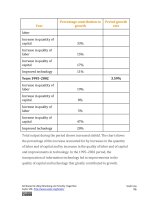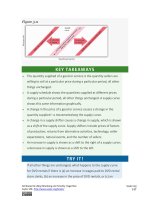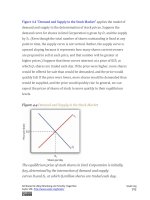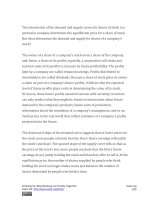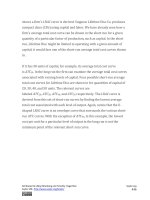Authors libby rittenberg 797
Bạn đang xem bản rút gọn của tài liệu. Xem và tải ngay bản đầy đủ của tài liệu tại đây (492.58 KB, 1 trang )
Demerit goods are goods whose consumption the public sector
discourages, based on a presumption that individuals do not adequately
weigh all the costs of these goods and thus should be induced to consume
less than they otherwise would. The consumption of such goods may be
prohibited, as in the case of illegal drugs, or taxed heavily, as in the case of
cigarettes and alcohol.
Income Redistribution
The proposition that a private market will allocate resources efficiently if
the efficiency condition is met always comes with a qualification: the
allocation of resources will be efficient given the initial distribution of
income. If 5% of the people receive 95% of the income, it might be efficient
to allocate roughly 95% of the goods and services produced to them. But
many people (at least 95% of them!) might argue that such a distribution
of income is undesirable and that the allocation of resources that emerges
from it is undesirable as well.
There are several reasons to believe that the distribution of income
generated by a private economy might not be satisfactory. For example,
the incomes people earn are in part due to luck. Much income results from
inherited wealth and thus depends on the family into which one happens
to have been born. Likewise, talent is distributed in unequal measure.
Many people suffer handicaps that limit their earning potential. Changes in
demand and supply can produce huge changes in the values—and the
incomes—the market assigns to particular skills. Given all this, many
people argue that incomes should not be determined solely by the
marketplace.
Attributed to Libby Rittenberg and Timothy Tregarthen
Saylor URL: />
Saylor.org
797
